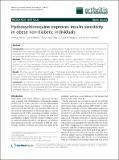| dc.contributor.author | Mercer, Emileigh | |
| dc.contributor.author | Rekedal, Laura | |
| dc.contributor.author | Garg, Rajesh Kumar | |
| dc.contributor.author | Lu, Bing | |
| dc.contributor.author | Massarotti, Elena M. | |
| dc.contributor.author | Solomon, Daniel Hal | |
| dc.date.accessioned | 2013-03-18T19:04:39Z | |
| dc.date.issued | 2012 | |
| dc.identifier.citation | Mercer, Emileigh, Laura Rekedal, Rajesh Garg, Bing Lu, Elena M Massarotti, and Daniel H Solomon. 2012. Hydroxychloroquine improves insulin sensitivity in obese non-diabetic individuals. Arthritis Research & Therapy 14(3): R135. | en_US |
| dc.identifier.issn | 1478-6354 | en_US |
| dc.identifier.uri | http://nrs.harvard.edu/urn-3:HUL.InstRepos:10436305 | |
| dc.description.abstract | Introduction: Hydroxychloroquine (HCQ) is a common disease modifying therapy for the treatment of rheumatoid arthritis (RA). Prior research suggests that HCQ may reduce the risk of diabetes mellitus in patients with RA. To investigate the mechanism of this effect, we examined the effect of HCQ on insulin resistance, insulin sensitivity, and pancreatic β-cell secretion of insulin in non-diabetic, obese subjects. Methods We recruited 13 obese, non-diabetic subjects without systemic inflammatory conditions for an open-label longitudinal study of HCQ 6.5 mg per kilogram per day for six weeks. Subjects underwent an oral glucose tolerance test at three time points: 0 weeks (pre-treatment with HCQ), 6 weeks (at the end of the HCQ treatment), and 12 weeks (6 weeks post HCQ-treatment). The Matsuda Insulin Sensitivity Index (ISI), HOMA-IR, and HOMA-B were compared across time-points. Results: The mean age of the cohort was 49 years, 77% females and median body mass index was 36.1 kg/m2. After 6 weeks of HCQ therapy, ISI increased from a median (interquartile range) of 4.5 (2.3-7.8) to 8.9 (3.7-11.4) with a p-value of 0.040, and HOMA-IR decreased from a median of 2.1 (1.6-5.4) to 1.8 (1.02-2.1) with a p-value of 0.09. All these variables returned toward baseline at week 12. Conclusion: HCQ use for 6 weeks in non diabetic obese subjects was associated with a significant increase in ISI and trends toward reduced insulin resistance and insulin secretion. These data suggest that HCQ, a common medication used to treat RA, possesses beneficial effects upon insulin sensitization. Further study of the insulin sensitizing effects of HCQ in patients with RA is warranted. | en_US |
| dc.language.iso | en_US | en_US |
| dc.publisher | BioMed Central | en_US |
| dc.relation.isversionof | doi:10.1186/ar3868 | en_US |
| dc.relation.hasversion | http://www.ncbi.nlm.nih.gov/pmc/articles/PMC3446518/pdf/ | en_US |
| dash.license | LAA | |
| dc.title | Hydroxychloroquine improves insulin sensitivity in obese non-diabetic individuals | en_US |
| dc.type | Journal Article | en_US |
| dc.description.version | Version of Record | en_US |
| dc.relation.journal | Arthritis Research & Therapy | en_US |
| dash.depositing.author | Solomon, Daniel Hal | |
| dc.date.available | 2013-03-18T19:04:39Z | |
| dc.identifier.doi | 10.1186/ar3868 | * |
| dash.contributor.affiliated | Garg, Rajesh | |
| dash.contributor.affiliated | Massarotti, Elena | |
| dash.contributor.affiliated | Lu, Bing | |
| dash.contributor.affiliated | Solomon, Daniel | |


